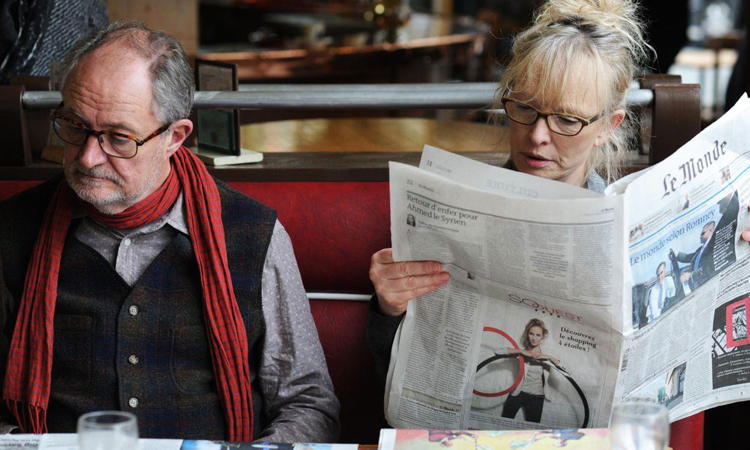By Nguyen Le · March 10, 2014

For British couple Nick and Meg, returning to Paris after their honeymoon means working out the crises and reconnecting are more important than re-seeing the sights and re-smelling the roses. The rom-com, from Roger Michell and frequent Hanif Kureishi, has a good set-up, but falls a bit short in its execution.
Honestly, I don’t think they could’ve picked a better cast. Pairing the best of UK theater together is a fantastic idea as both Jim Broadbent (Hot Fuzz, Moulin Rouge!) and Lindsay Duncan (About Time, HBO’s Rome) make an effective couple – in terms of appearance and, especially, portraying the fact that their spark is on life-support. Always a joy to watch on-screen, Broadbent has an expressive pair of eyes that speak a lot without him delivering a line. As a result it’s all convincing: Nick’s yearning to be able to please his wife again, to out-loud admit his faults which could’ve made everything better and to discover a method that can lighten up the current situation. Duncan, on the other hand, is a master of diction, effortlessly equipping her lines with either softness or, most of the time, sharpness. Her lines bite and you’ll feel it – all the teeth and, in the bigger picture, her need to disconnect from the present to avoid feeling “like being arrested” anymore. Now this here is the ‘danger zone’ as Meg’s detachment is so overwhelming viewers will either praise Duncan’s acting or be very annoyed at the character, maybe even starting out at the former and end at the latter.
Perhaps the conflict, which is the heart of Hanif Kureishi‘s script, could’ve been toned down a little bit because it’s been so well-established already. Starting Le Week-End with the couple bickering is an efficient way to introduce things – the who, what, why and what’s been going on – but too many occasions of it risks the film turning into an ‘annoying old people’ flick. Le Week-End’s far from it, in fact, however first impressions are hard to change. Another point of concern is how sparse out the story beats are in the second act, dragging the pace down from its acceptable level. While it’s nice to see another film from director Roger Michell (Changing Lanes, Notting Hill, Venus) that deals with more mature elements of human relationships, Kureishi’s frequent dips into reminding said elements hamper my attention throughout Le Week-End. Luckily, I still want to get to the end because there’s tremendous fun watching Broadbent and Duncan going through this troubling period of their lengthy married life, delivering bursts of genius writing by Kureishi or taking part in scenarios only wild young couples would do that he had conjured up.
There’s also plenty of entertainment absorbing the wonderful photography by Nathalie Durand (Blame it on Fidel!), showcasing Paris without resorting to the ‘tourist vision’ approach and a style that’s well aware of colors but never let them flood the gray tone. The latter in particular is Le Week-End’s success for it gives the production a clean look and subtly evokes the film’s idea of looking beyond your own rifts to see happiness surrounds you. The typical French-ness however, is brought forth by Jeremy Sams’s music (Enduring Love, The Mother) and, like most scores that point out the city’s romantic trait, it does a good job of gelling scenes together or on certain occasions do the talking for the actors.
Throughout its running time, I just can’t help but feeling maybe Le Week-end may have worked better as a play then a film. Wonderful performances (including a fun but quite “huh?” supporting turn from Jeff Goldblum) and nice aesthetics help make Le Week-end a passable trip to Paris, a trip to be honest could’ve been much better.